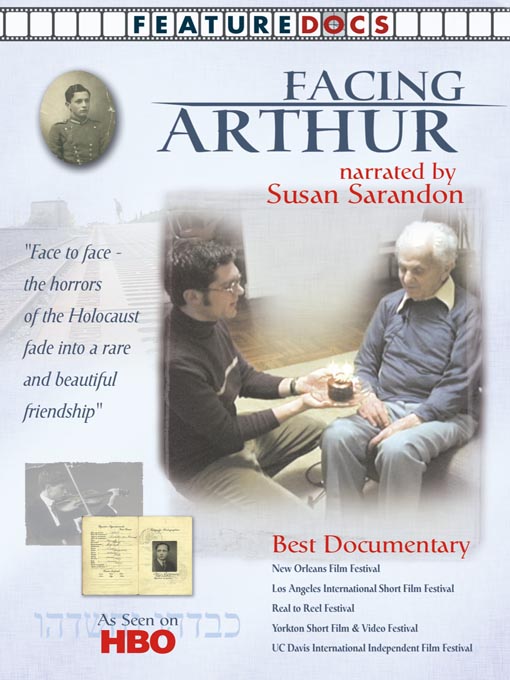When
I think about the story behind the story I come to the conclusion that when you
point a camera or a microphone at people you may change their lives, or the
subject may change many people's lives.
The
Holocaust is a human atrocity that needs to be studied by all human beings with
the hope that when learning from the past it can be prevented. Sadly it is not.
It is easier for people to bury their heads in the sand, not face reality, or
deal with such failure of the human race.
As
a daughter of Holocaust survivors, dealing with any subject that relates to the
Holocaust is vital important for me. After all, the people who managed to
survive are almost all dead. I always
ask, when they have all perished, will anyone remember?
The
other night, at the home of my friend Dr. Yzhar Charuzi I watched the docufilm,
'Facing Arthur', in which the two characters prefer to deal with reality with
hard core honesty combined with emotion.
Three
graduate students had gone out to record, on film, the relationship between
clients of the Jewish social service organization caring for Holocaust survivors
Dorot
(http://www.dorotusa.org/site/PageServer?pagename=homepage_DOROT), and a group
of young German home service aids. In
their travels they opened a door at 116th Street and Broadway, New York, and
found themselves in the apartment of Arthur Lederman.
A
touchy point for me was that Arthur Lederman, Dr. Charuzi's second cousin, is
not a fictional character, rather a 101 year old man who, until 1938, lived in the Free City of Danzig (German: Freie Stadt Danzig),
today Gdańsk, Poland. In September 1938 Arthur fled Europe to New York leaving
behind his entire family, who were all murdered by Hitler's Nazi savages.
In
Germany, the country that perpetrated the Holocaust, many people already know
very little what two generations ago Germans were capable of doing. The Germans
of the 21st century prefer to bury their heads deep in the sand of
denial; they do not wish to take responsibility for what their grandparents had
the impudence to do.
But
then not all Germans. Some have the courage to face reality and deal with it.
One, at the time when the film was made, is twenty year old Christoph Erbslöh, a descendant
of a Nazi soldier.
Christoph is a conscientious objector and in
Germany instead of serving in the military, people like him do community
service. Christoph, who had interested to know about the events of the
Holocaust and studied its history found an organization that works with
Holocaust survivors and participates in the community service program. He
joined Action Reconciliation / Service for Peace
(ARSP) (http://www.actionreconciliation.org/), the Berlin based German
peace-organization "Aktion S®hnezeichen Friedensdienste" that sends
about 150 young German adults annually to countries which were affected by WW
II in order to work with the peoples who suffered through the Nazi regime; i.e.
Netherlands, Norway, Belgium, Israel, Great Britain, France, Poland, USA,
Commonwealth of Independent States (former USSR) and the Czech Republic. These
volunteers work in a broad variety of peace, social-justice and social service
organizations.
Christoph was sent to New York and the first time he
met Arthur Lederman was in November 1999. For two years, each Thursday, he attends and spends the day with Arthur.
The camera follows the
two men for two years and through its lens the audience experience the positive
development of their relations; it is between two men who are two generations
apart but have a very abominable commonality.
The viewer is shown the extraordinary, moving and gradually
developing relationship between the young German, Christoph, and old Arthur, too frail to leave his New York City apartment
where he lived for sixty years, who managed to escape the Holocaust but is
deeply affected by the loss of his entire family to Hitler's atrocities. Although
being very different people, a strong bond forms, and changes both of them
forever.
In
Poland Arthur was a renowned concert violinist. Christoph is a budding cellist.
The two discover that while history is unchangeable, they have much in common
and much to talk about. By facing Christoph, Arthur can look the enemy's
descendent in the face; facing Arthur young Christoph confronts the legacy of
Germany’s Nazi generation and his own place in a modern Germany. Their
relationship becomes a metaphor for the meaning of atonement and the [possibility
of] reconciliation between a murder and his victim.

When
the two men parted, one can sum the movie by quoting Arthur Lederman: "We
must keep in mind that it takes a long time to make a friend; it takes a short
time to lose a friend!"
Arthur
passed away in 2004, at the age of 104, and with that one other Holocaust generation
survivor took the pain of the entire Jewish nation to his grave. Christoph went on with his life, apparently
now married and living in Berlin, German. As of this writing, though I tried
making contact with him through Facebook, he did not reply.
The
pain of the wound of the Holocaust is still somewhat fresh with every Jew. I
wonder though how long before it is totally healed and forgotten; I hope never.
Because with the end of the Holocaust came the vow NEVER AGAIN!
To
watch the movie Facing Arthur (2005):
http://www.amazon.com/Facing-Arthur-Susan-Sarandon/dp/B0007WFXRQ
Susan Sarandon (Actor-narrator), Michael Rey (Director), Stefan Knerrich (Director)
Facing Arthur: Movie Trailer: http://www.metacafe.com/watch/4198508/facing_arthur_movie_trailer/

No comments:
Post a Comment